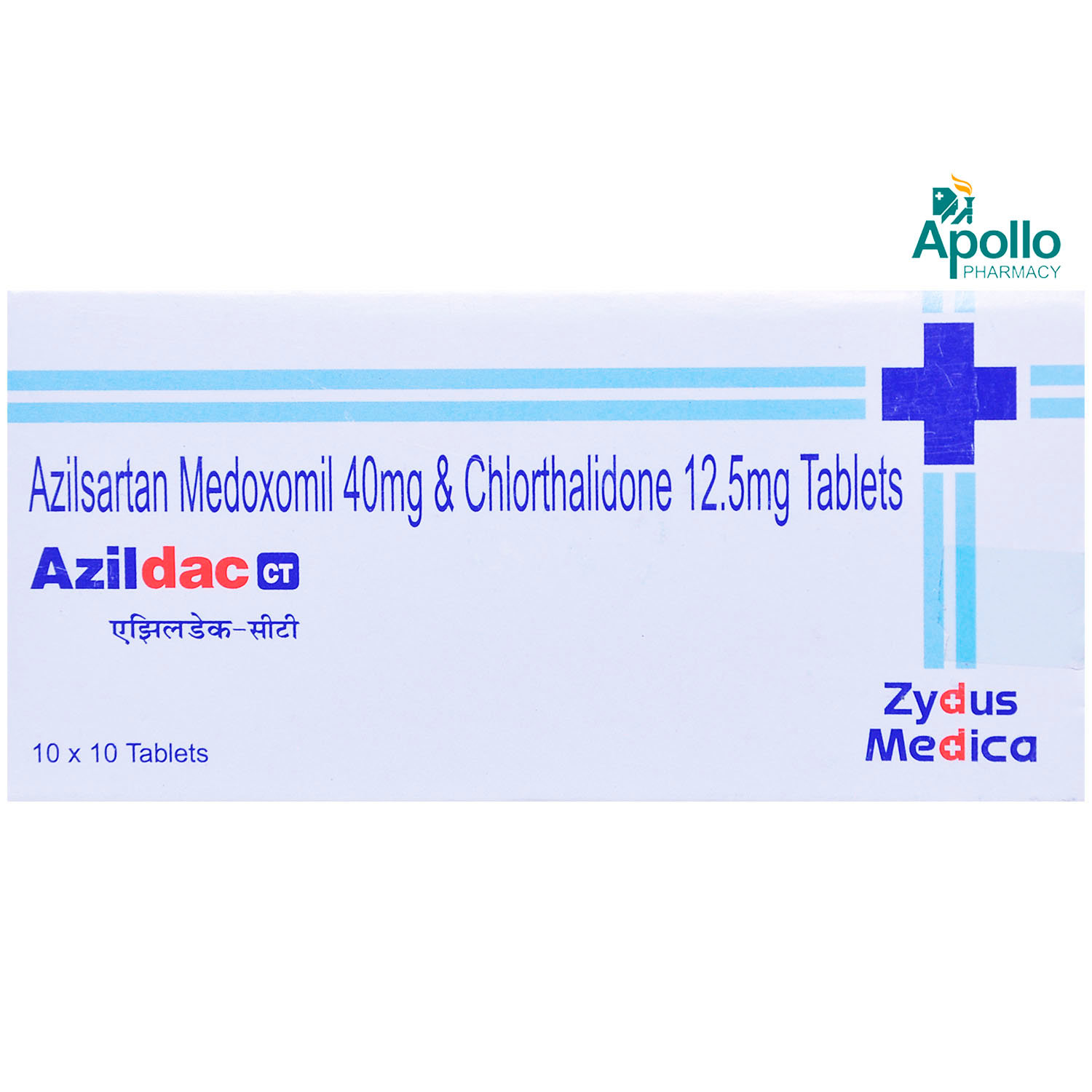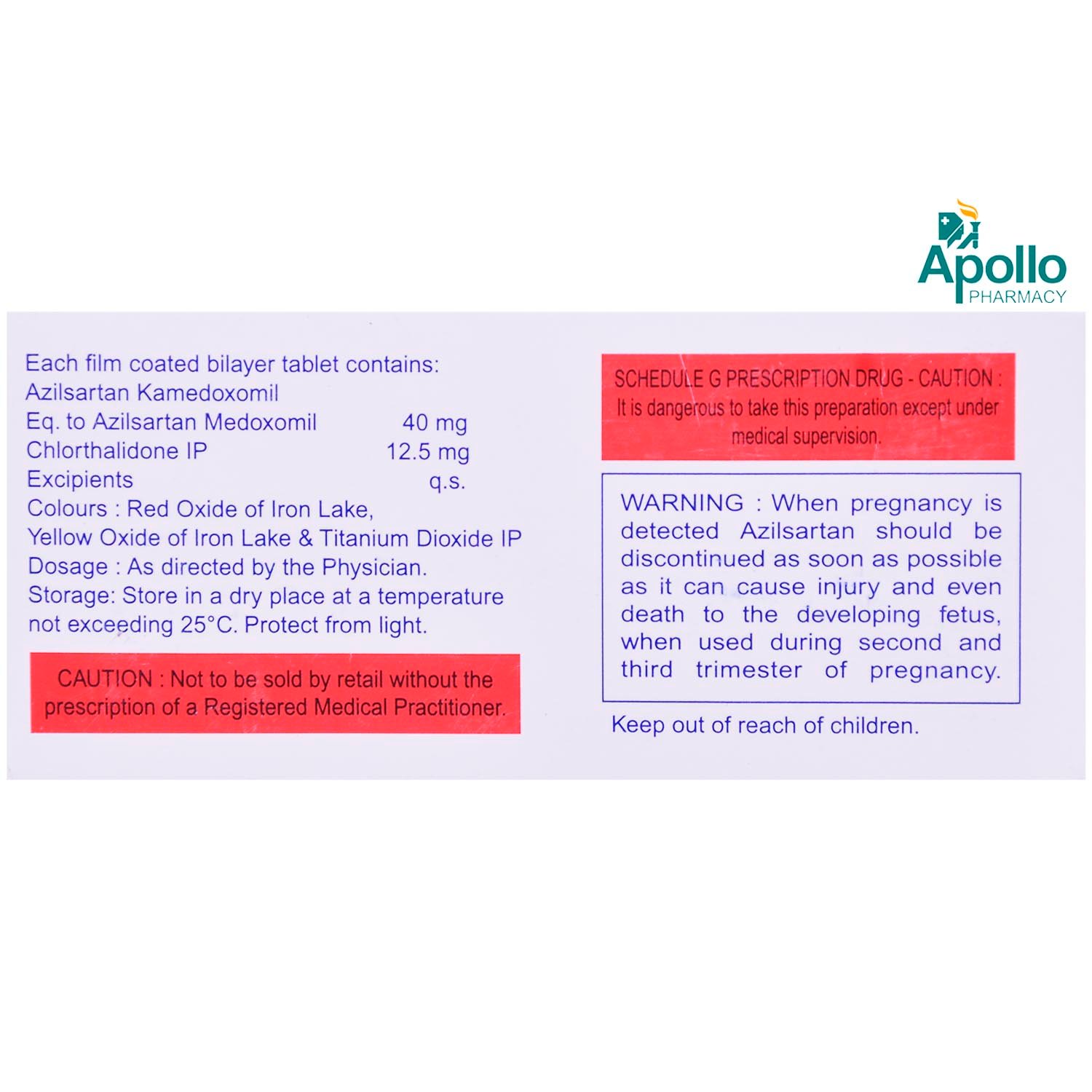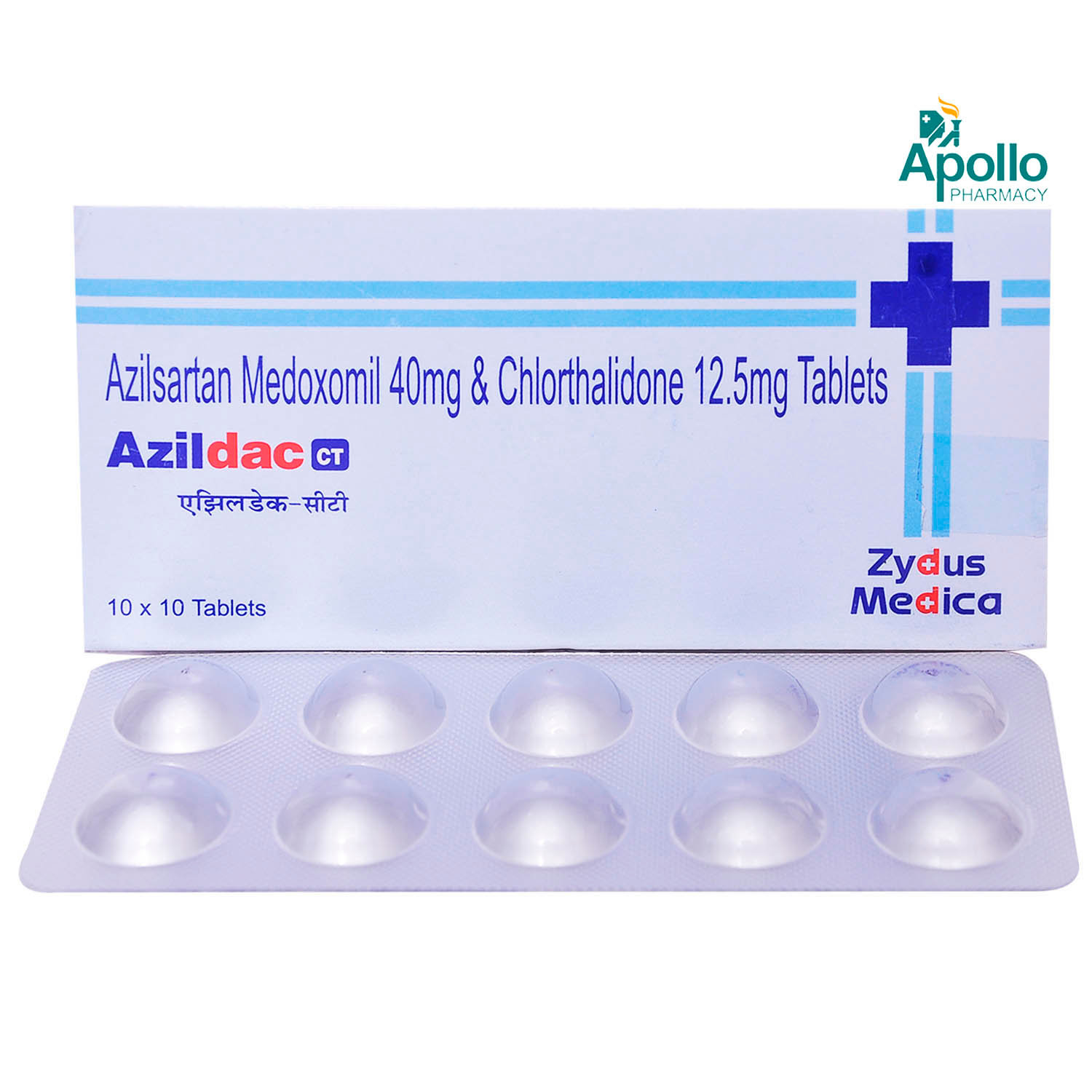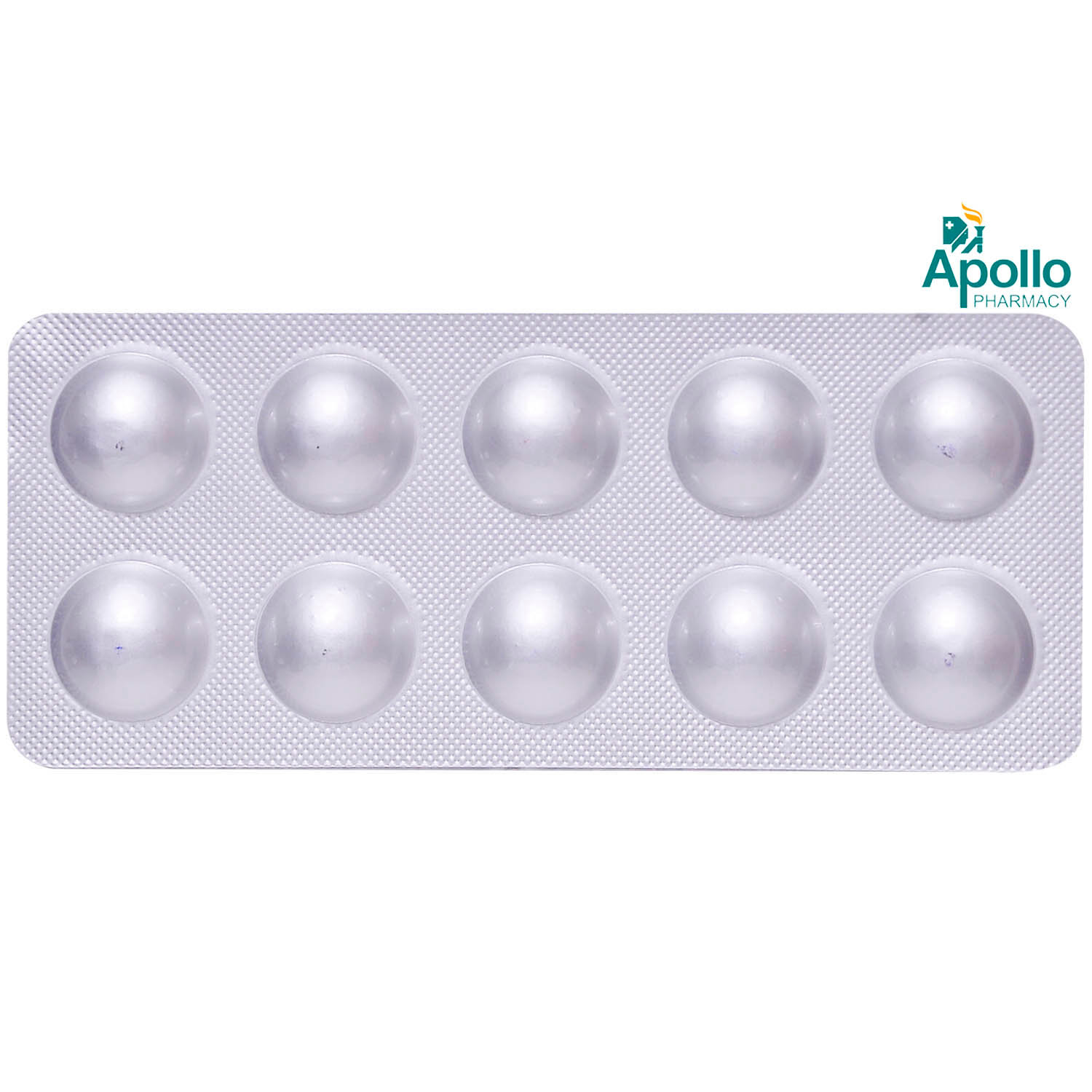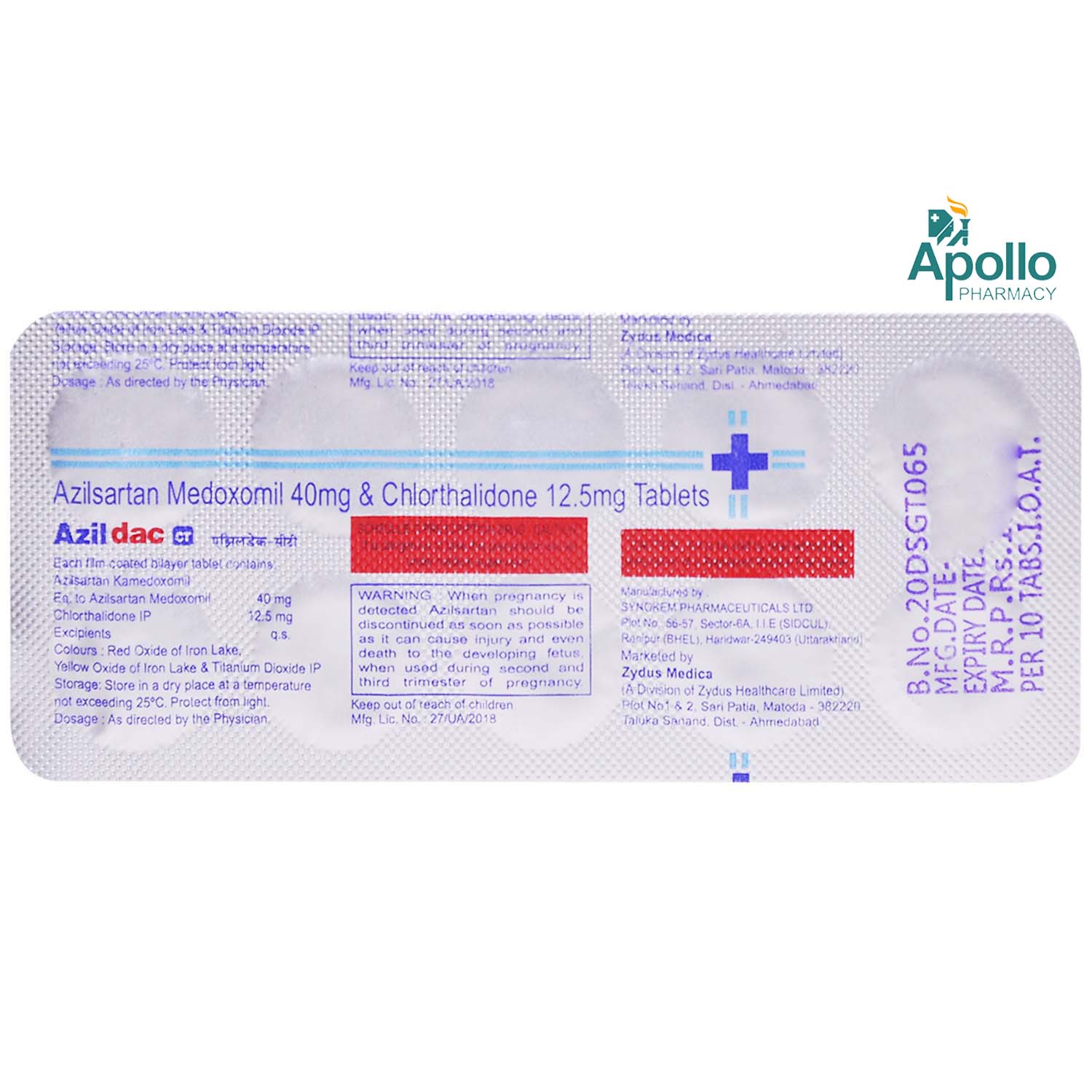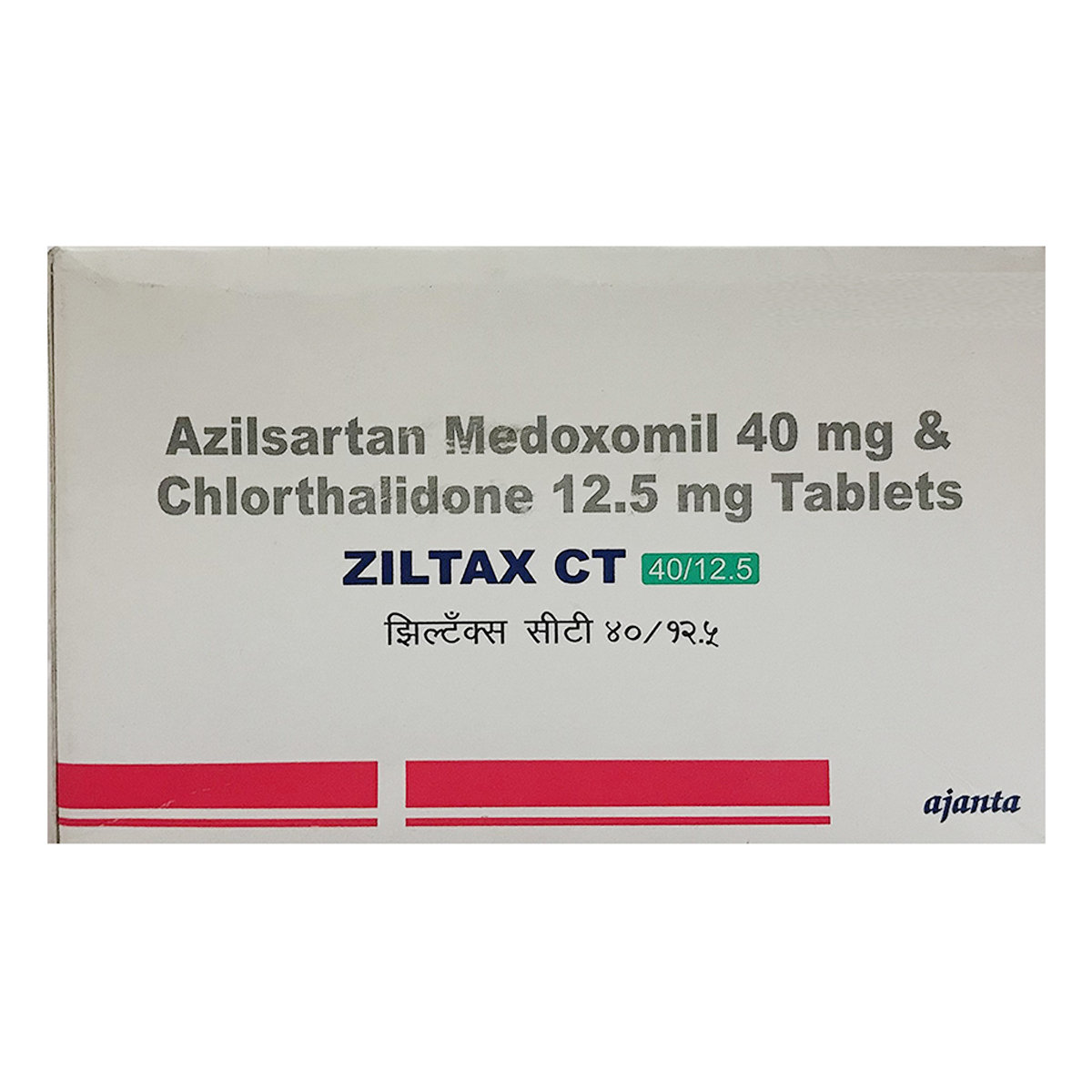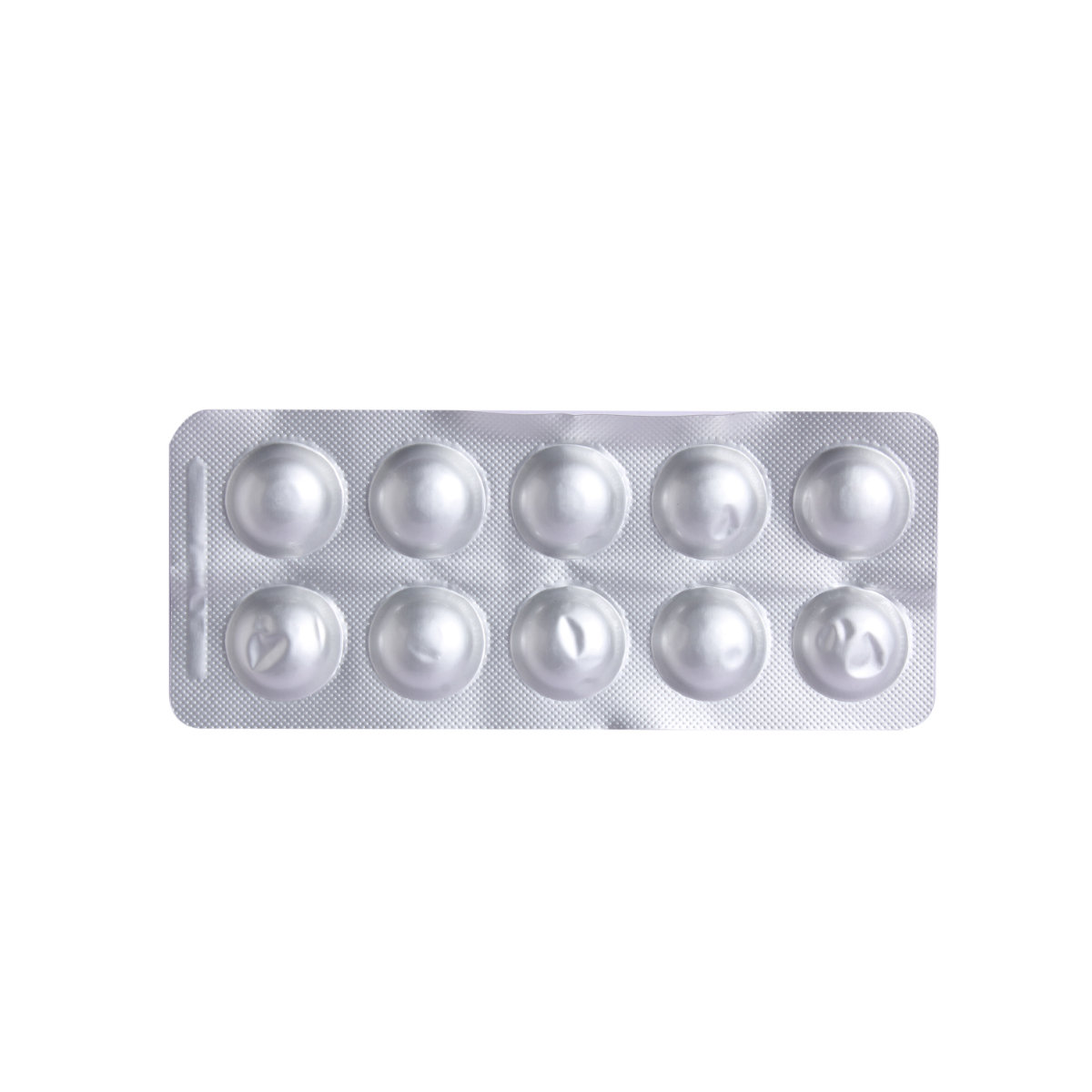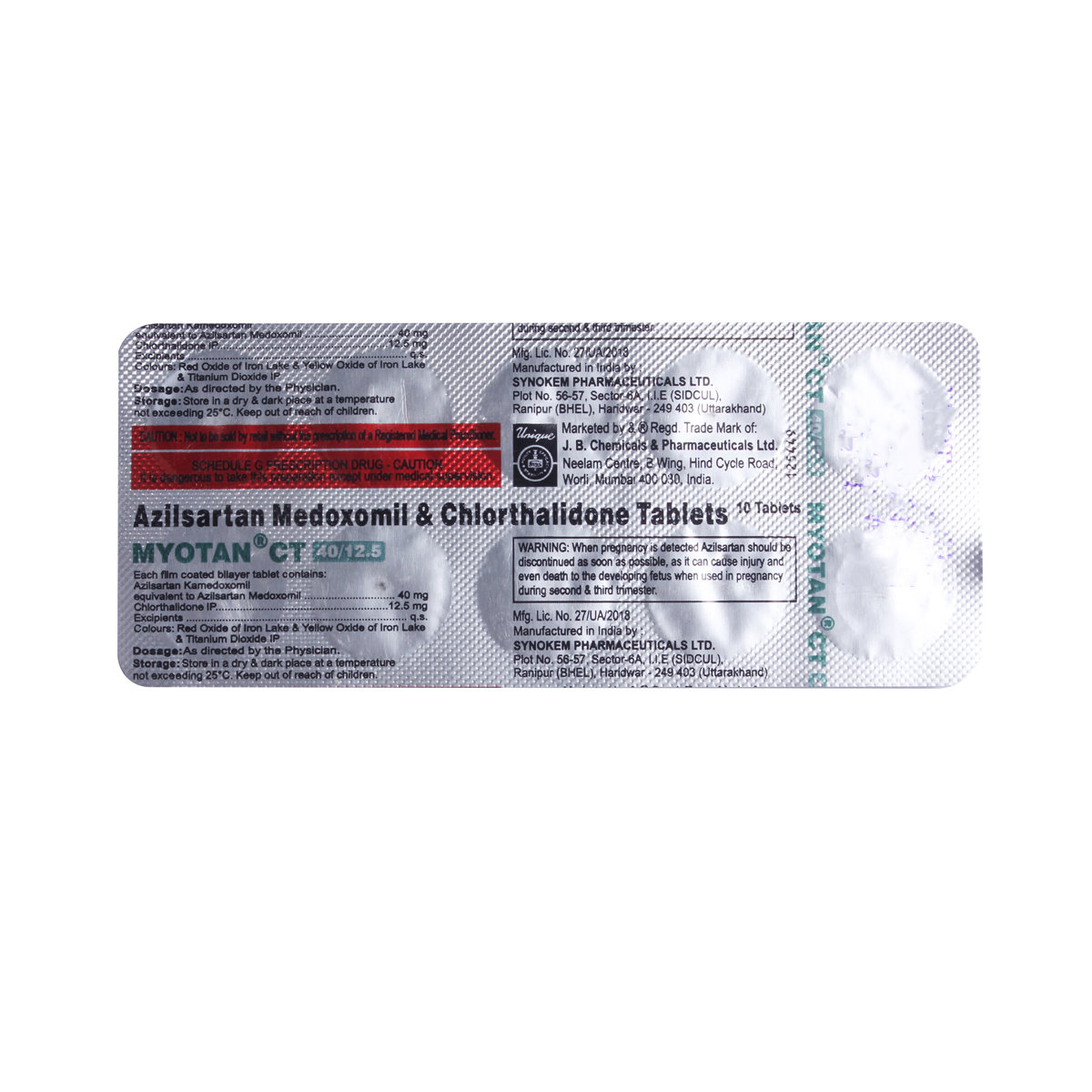Azildac CT Tablet 10's
MRP ₹144
(Inclusive of all Taxes)
₹21.6 Cashback (15%)
Provide Delivery Location
Online payment accepted
 Prescription drug
Prescription drugWhats That
Composition :
Manufacturer/Marketer :
Consume Type :
Expires on or after :
Return Policy :
About Azildac CT Tablet
Azildac CT Tablet belongs to the class of drugs called anti-hypertensive agents primarily used to treat high blood pressure (hypertension). Hypertension (high blood pressure) is a medical condition in which the blood pressure is elevated persistently in the arteries. High blood pressure is mostly caused by obesity, diabetes, smoking, high salt intake, stress, lack of physical activity or ageing.
Azildac CT Tablet consists of two medicines, namely: Azilsartan and Chlorthalidone. Azilsartan is an angiotensin receptor blocker (ARB) that works by blocking the hormone angiotensin. This helps relax the blood vessels, allowing the blood to flow more smoothly and the heart to pump more efficiently. Chlorthalidone belongs to thiazide diuretics (water pill) which inhibits fluid retention or build-up. Thus, it relaxes the blood vessels and improves blood circulation. Together, Azildac CT Tablet helps lower raised blood pressure.
Your doctor will decide the dosage and duration based on your medical condition. In some cases, Azildac CT Tablet can cause side effects like nausea, taste changes, stomach upset, diarrhoea, headache, weakness, dizziness, and decreased blood pressure. Most of these side effects of Azildac CT Tablet do not require medical attention and gradually resolve over time. However, if these side effects persist longer, please consult your doctor.
Before taking Azildac CT Tablet , let your doctor know if you have kidney, liver problems or severe dehydration. Avoid using Azildac CT Tablet if you are pregnant. Breastfeeding women should consult their doctor before taking Azildac CT Tablet . Do not consume alcohol with Azildac CT Tablet as it may increase the risk of side effects. Avoid driving or operating machinery if you experience dizziness. Keep your doctor informed about your health condition and medications to rule out any interactions.
Uses of Azildac CT Tablet
Directions for Use
Key Benefits
Azildac CT Tablet is a combination of Azilsartan and Chlorthalidone. It is used to treat high blood pressure. Azilsartan is an angiotensin receptor blocker (ARB). It works by blocking the hormone angiotensin, thereby relaxing blood vessels. This allows the blood to flow more smoothly and the heart to pump more efficiently. Chlorthalidone is a diuretic that removes extra water and certain electrolytes from the body. Over time it also relaxes blood vessels and improves blood flow. Together, Azildac CT Tablet helps treat high blood pressure.
Storage
Drug Warnings
Do not stop taking Azildac CT Tablet without your doctor's advice. Sudden stopping of Azildac CT Tablet may cause changes in your blood pressure. Inform your doctor about gout, electrolyte imbalance, dehydration, heart, kidney or liver problems. Consult your doctor before using Azildac CT Tablet if you are breastfeeding. Avoid taking Azildac CT Tablet if you are pregnant. Drive or operate machinery only if you are alert, as Azildac CT Tablet may cause dizziness. Avoid alcohol consumption as it may cause unpleasant side effects. Keep your doctor informed about your health condition and medications to rule out any side effects.
Drug-Drug Interactions
Drug-Drug Interactions
Login/Sign Up
Taking Aliskiren with Azildac CT Tablet can increase the risk of low blood pressure and high potassium levels in the body.
How to manage the interaction:
Taking Azildac CT Tablet with Aliskiren is generally avoided as it may lead to an interaction, it can be taken if prescribed by the doctor. Consult the doctor if you experience vomiting, weakness, tingling in your hands and feet, or palpitations. Make sure to hydrate while taking these medications. It is advised to reduce the intake of potassium-rich foods. Do not discontinue any medications without a doctor's advice.
Co-administration of Azildac CT Tablet and cisapride may increase the risk or severity of an irregular heart rhythm that may be serious.
How to manage the interaction:
Taking Azildac CT Tablet with Cisapride is not recommended, please consult your doctor before taking it. Do not discontinue the medication without consulting a doctor.
Taking Azildac CT Tablet with Enalapril may cause low blood pressure, kidney function impairment, and increased potassium levels in the blood.
How to manage the interaction:
Although taking Azildac CT Tablet with Enalapril together can result in an interaction, it can be taken if a doctor has prescribed it. Consult a doctor if you experience symptoms like vomiting, weakness, confusion, tingling in your hands and feet, or palpitations. Do not stop using any medications without talking to a doctor.
Taking Azildac CT Tablet with Ramipril may cause low blood pressure, kidney function impairment, and increased potassium levels in the blood.
How to manage the interaction:
Although taking Ramipril together with Azildac CT Tablet can result in an interaction, they can be taken together if prescribed by a doctor. However, consult a doctor if you experience vomiting, weakness, confusion, tingling in the hands and feet, or palpitations. Do not discontinue any medications without a doctor's advice.
Taking Azildac CT Tablet with Quinapril may cause low blood pressure, kidney function impairment, and increased potassium levels in the blood.
How to manage the interaction:
Although taking Azildac CT Tablet with Quinapril together can result in an interaction, it can be taken if a doctor has prescribed it. Consult a doctor if you experience vomiting, weakness, tingling in your hands and feet, or palpitations. Do not discontinue any medications without a doctor's advice.
Co-administration of Azildac CT Tablet with Amiloride may increase potassium levels in the blood.
How to manage the interaction:
Although taking Amiloride and Azildac CT Tablet may lead to an interaction but can be taken if prescribed by the doctor. However, consult the doctor if you experience vomiting, weakness, tingling in your hands and feet, or palpitations. Do not discontinue the medications without consulting a doctor.
Taking Azildac CT Tablet with Potassium iodide may cause low blood pressure, kidney function impairment, and increased potassium levels in the blood.
How to manage the interaction:
Although taking Azildac CT Tablet with Potassium iodide together can result in an interaction, it can be taken if a doctor has prescribed it. However, consult a doctor if you experience vomiting, weakness, tingling in your hands and feet, or palpitations. Do not discontinue any medications without a doctor's advice.
Taking Lithium with Azildac CT Tablet can increase the blood levels of Lithium.
How to manage the interaction:
Although taking Azildac CT Tablet and Lithium together can result in an interaction, it can be taken if a doctor has prescribed it. However, if you experience dizziness, vomiting, muscle weakness, ringing in the ears, excessive thirst, or increased urination, you should consult a doctor. Do not discontinue any medication without consulting a doctor.
Co-administration of Azildac CT Tablet with Amiloride may raise potassium levels in the blood.
How to manage the interaction:
Although taking Amiloride and Azildac CT Tablet together can result in an interaction, it can be taken if a doctor has prescribed it. However, consult a doctor if you happen to experience nausea, vomiting, weakness, disorientation, tingling in your hands and feet, feelings of heaviness in your legs, or a slow or irregular heartbeat. Do not discontinue any medications without a doctor's advice.
Taking Azildac CT Tablet with Potassium chloride may increase potassium levels in the blood.
How to manage the interaction:
Although taking Azildac CT Tablet with Potassium chloride together can result in an interaction, it can be taken if a doctor has prescribed it. Consult the doctor if you experience vomiting, weakness, tingling in your hands and feet, or palpitations. Do not discontinue any medications without a doctor's advice.
Drug-Food Interactions
Drug-Food Interactions
Login/Sign Up
Diet & Lifestyle Advise
- Do regular physical activity or exercise.
- Limit sodium chloride intake (table salt) in your daily diet.
- Avoid smoking and alcohol consumption.
- Avoid chronic stress, as it can raise your blood pressure. Try to enjoy and spend time with your loved ones to cope with stress.
- Try including heart-healthy omega-3 fatty acid-containing foods in your daily diet. You can also use low-fat cooking oils.
- A low salt/sodium diet and regular exercise are recommended along with Azildac CT Tablet for effective results.
Side Effects of Azildac CT Tablet
- Nausea
- Taste changes
- Stomach upset
- Diarrhoea
- Headache
- Weakness
- Dizziness
- Decreased blood pressure (hypotension)
Habit Forming
Therapeutic Class
All Substitutes & Brand Comparisons
RX
Out of StockMacarbi CH Tablet 10's
Macleods Pharmaceuticals Ltd
₹109
(₹9.81 per unit)
24% CHEAPERRX
Out of StockAzutan CT 40 mg/12.5 mg Tablet 15's
Ajanta Pharma Ltd
₹195
(₹11.7 per unit)
9% CHEAPERRX
Out of StockZiltax CT 40 Tablet 15's
Ajanta Pharma Ltd
₹195
(₹11.7 per unit)
9% CHEAPER
Author Details
We provide you with authentic, trustworthy and relevant information
Drug-Diseases Interactions
Drug-Diseases Interactions
Login/Sign Up
FAQs
Drug-Drug Interactions Checker List
- METOPROLOL
- POTASSIUM CHLORIDE
- ASPIRIN
- CALCIUM CARBONATE
- MAGNESIUM HYDROXIDE
Special Advise
- Keep a check on your daily blood pressure, and if you notice any fluctuations, please consult a doctor.
- Thiazide diuretics like Chlorthalidone may increase serum triglyceride and cholesterol levels. Hence it is advised to monitor your cholesterol levels regularly.
- Chlorthalidone in Azildac CT Tablet may interfere with specific lab tests like parathyroid and protein-bound iodide tests; hence, inform the person doing the tests that you are taking Azildac CT Tablet .
- Your doctor may advise you to get a regular kidney function test and blood examinations for potassium levels and other electrolytes while using Azildac CT Tablet to rule out any renal impairment.
- Regular monitoring of blood glucose levels is advised in diabetic patients while using Azildac CT Tablet .
Disease/Condition Glossary
Hypertension: Hypertension is a medical condition in which blood pressure is elevated persistently in the arteries. It is considered an essential risk factor for cardiovascular diseases and can be caused due to obesity, diabetes, smoking, high salt intake, stress, lack of physical activity or ageing. Blood pressure is measured in the ratio of systolic pressure to diastolic pressure. Systolic pressure is the pressure when the heart pumps blood out. On the other hand, diastolic pressure is the pressure when your heart is at the resting stage between heartbeats. The ideal blood pressure range lies between 90/60 mmHg and 120/80 mmHg. It is considered high blood pressure if the blood pressure is 140/90 mmHg or greater.

Have a query?
Alcohol
Safe if prescribed
Avoid alcohol consumption with Azildac CT Tablet as it may cause increased dizziness.
Pregnancy
Consult your doctor
Azildac CT Tablet is not recommended for use during pregnancy since it may harm the baby. Consult your doctor before taking the Azildac CT Tablet if you plan to become pregnant or are already pregnant.
Breast Feeding
Consult your doctor
Please consult your doctor before taking Azildac CT Tablet if you are breastfeeding. Your doctor will decide if Azildac CT Tablet can be taken during lactation or not.
Driving
Safe if prescribed
Azildac CT Tablet may cause side effects like dizziness or tiredness. Hence, it is recommended not to drive or operate machinery until you are alert.
Liver
Consult your doctor
Let your doctor know if you have/had the liver disease before taking Azildac CT Tablet . Your doctor may adjust the dose accordingly.
Kidney
Consult your doctor
Let your doctor know if you have/had kidney disease before taking the Azildac CT Tablet . Your doctor may adjust the dose accordingly.
Children
Safe if prescribed
Safety and efficacy of Azildac CT Tablet have not been established in children.

